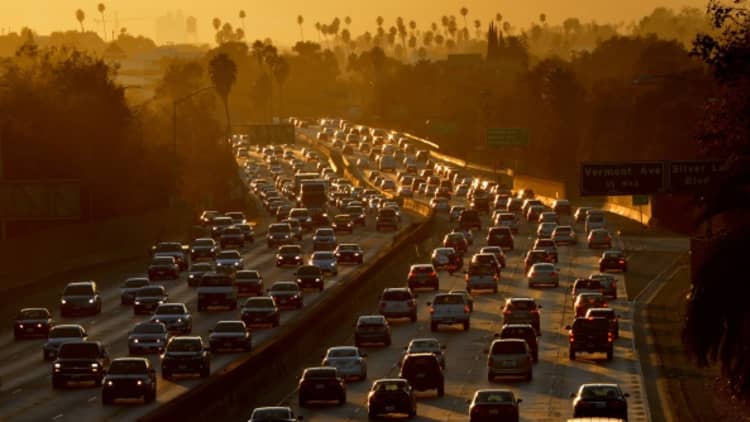Responding to the Trump administration's move to roll back tailpipe emissions standards, California regulators on Tuesday announced a proposal that would require car manufacturers to continue meeting the state's strict auto-emissions rules.
Under the proposed change by California, even if President Donald Trump's administration changes its vehicle greenhouse gas emissions standards, automakers wishing to sell cars in California after the 2020 model year would still be required to meet the state's strict standards.
The California Air Resources Board plan also would apply to any weaker federal emissions standards that might get adopted down the road.
Last week, the Trump administration announced plans to roll back Obama-era auto emissions standards and challenge California's tougher tailpipe carbon dioxide emissions rules. The White House has challenged California policies on several issues, from the environment to the state's controversial sanctuary law that seeks to protect undocumented immigrants.

"Dirty, gas guzzling vehicles are a direct assault on public health, and foreclose our ability to rein in air pollution and greenhouse gases," said CARB Chair Mary Nichols in a release. "California will take all actions to ensure that the smart standards we developed in partnership with the auto industry to cut greenhouse gas emissions from vehicles stay in place."
Under a CARB regulation adopted in 2012, cars meeting federal standards for model years 2017 to 2025 are considered as complying with California standards. A dozen states and the District of Columbia follow California's greenhouse gas emissions standards for motor vehicles, but the White House wants to have one national standard.
In its announcement last week, the U.S. Environmental Protection Agency and U.S. Department of Transportation's National Highway Traffic Safety Administration proposed new fuel economy standards for vehicles for the model years 2021 to 2026. The agencies also said at the time they are seeking public comment on several regulatory options, including an alternative that would lock in model year 2020 standards through 2026.
California is one of 18 states that filed a lawsuit in May in connection with the EPA's determination that existing fuel economy and greenhouse gas emissions standards for cars and light trucks for the model years 2022 to 2025 "should be revised." In taking the step, then-EPA head Scott Pruitt said, "[T]he current standards are not appropriate" and went on to say President Barack Obama's administration had wrongly "set the standards too high."
CARB said it is seeking public input on its plan, including "comments on potential flexibilities that might allow for continued compliance with the federal standards, or reward national actions to promote cleaner vehicles." The comment period will run through Sept. 24, and the regulator's board will consider the proposal for adoption at its regular meeting on Sept. 27-28.
The acting administrator of EPA, Andrew Wheeler, recently met with the chair of CARB "and has pledged to work in earnest with the state of California to find a solution," said EPA spokesman James Hewitt. "EPA is looking forward to sitting down with California in the very near future to have a conversation about whether an agreement can reached."
The White House and the U.S. Department of Transportation have not responded to CNBC's requests for comment as of publication.


